Water flows through the 2018 World Economic Forum Global Risks Report
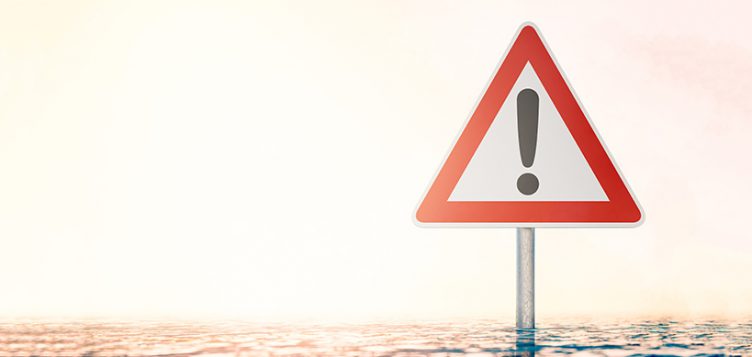
By Andi Sutton, Abdul Latif Jameel World Water and Food Security Lab (J-WAFS)
| This January 2500 delegates and 70 world leaders from 100 different countries braved the heaviest snowfall in decades to meet in Davos, Switzerland at the World Economic Forum (WEF). The extreme weather provided an apt backdrop for the sessions ahead, which were focused on the blizzard of social, economic, and environmental challenges that can be seen across the globe, and which included the issue of extreme weather events driven by climate change.
Driving the content for the week’s discussions was the WEF’s recently released Global Risks Report, which compiles the results of a survey of 1,000 experts and decision makers who weigh 30 global risks against the present geopolitical climate to rate their likelihood and potential impact across a 10-year horizon. This year, environmental risks were at the forefront, with water crises singled out as the fifth greatest global risk, behind weapons of mass destruction, extreme weather events, natural disasters, and failure of climate change mitigation and adaptation. |
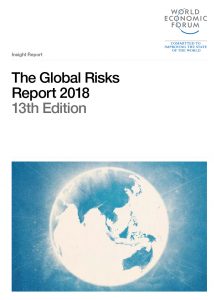 |
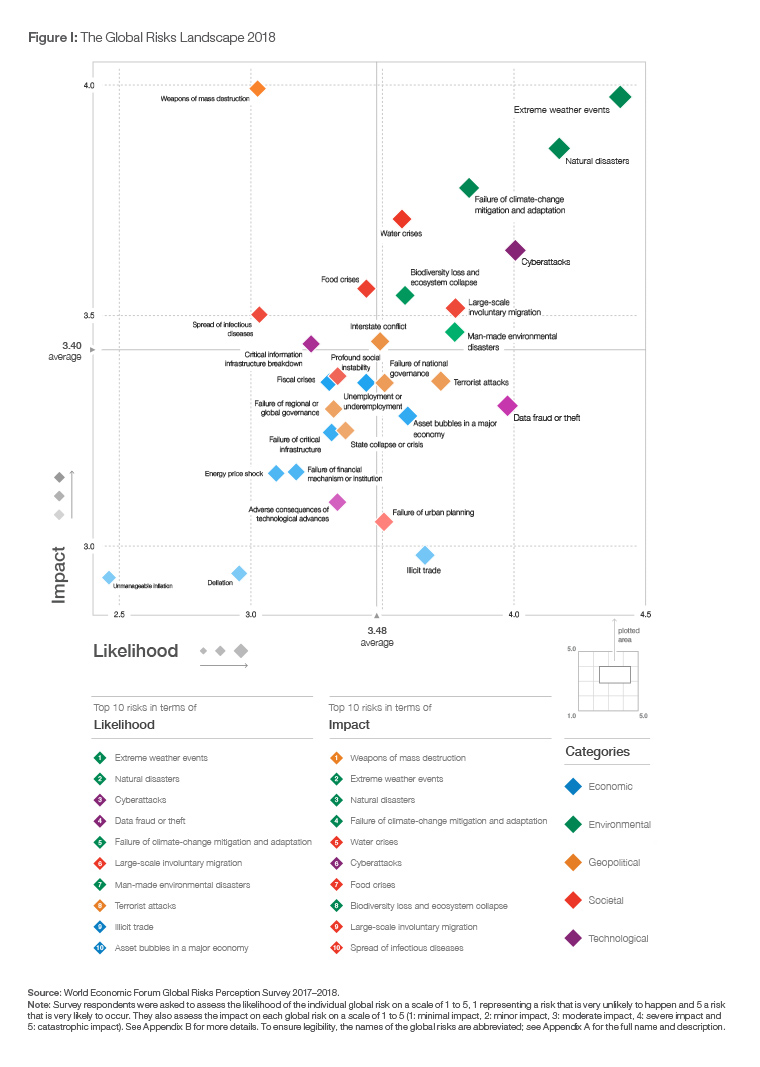
Water crises do not exist in a vacuum, however. Water is, in fact, intrinsic to many of the global risks singled out by the WEF in the report, including the failure of climate change mitigation, food crises, biodiversity loss, involuntary migration, spread of infectious disease, and various others. The report’s executive summary acknowledges the inability of a ranked list to capture this complexity: “Humanity cannot deal with the multiplicity of challenges we face either sequentially or in isolation,” write the WEF’s executive chairman, Klaus Schwab, and president, Børge Brende. They follow with a call to action: “Just as global risks are increasingly complex, systemic, and cascading, so our responses must be increasingly interconnected across the numerous global systems that make up our world.”
A program at MIT is following this call, with a boundary-crossing approach to global water and food systems challenges. The Abdul Latif Jameel World Water and Food Security Lab (J-WAFS) at the Massachusetts Institute of Technology is an Institute-wide effort to address the collective pressures that endanger water and food systems around the globe. Launched in 2014, J-WAFS catalyzes water and food research at MIT in a variety of ways, including research and commercialization grants, graduate student fellowships, and international expert workshops. Our approach to global challenges is to emphasize solutions: the deployment of effective technologies, programs, and policies that will have a measurable and international impact as humankind adapts to a rapidly expanding and evolving population on a changing planet.
At J-WAFS, we are deeply aware of the way water flows through multiple global-scale challenges. This is one of the drivers of our interdisciplinary approach and a reason that MIT—an institution where collaboration across disciplines is commonplace—is a particularly exciting seedbed for solutions-oriented research in water and food.
Take water’s relationship to number four on the list: the failure of climate change mitigation and adaptation. One J-WAFS-funded project could prove influential. Susan Solomon, an MIT professor and leader in the field of atmospheric science and member of the Intergovernmental Panel on Climate Change (IPCC), and Kenneth Strzepek, an MIT research scientist whose work in engineering, water resource planning, and management has had global influence, have developed an agricultural model that estimates crop production in Africa based on water, soil quality, and temperature stressors connected to climate change. The data used in this model represent 122 possible climate futures; the resulting observations provide more precise projections of climate change impacts across Africa. Using this model, the team can assess yield projections for a variety of crops, as well as the influence of climate change on water resource limitations more broadly. In one application, the research team has integrated its crop model with one for water resource management to project water availability and demand in the largest river basins in Africa: the Congo, Niger, Nile, Senegal, Upper Orange, Volta, and Zambezi. The results outline regional and national trends in water availability in response to the simultaneous pressures of climate change, population growth, expanded hydropower and expanded irrigation. The knowledge gained from these results could help regional policymakers plan more resilient agricultural practices and water infrastructure systems that more effectively adapt to climate change.
As the previous example makes clear, the connection between water and food crises, ranked seventh on the list, is obvious. Water is essential for our food systems from farm to table. In fact, members of the World Economic Forum learned more about this connection from MIT experts including J-WAFS director John Lienhard in a panel at the 2015 annual WEF meeting in Davos. Prof. Lienhard addressed the increasing stresses on global water supplies, among them food. “The pressure on water is tightly coupled with the production of food,” he commented. “More than 70% of freshwater withdrawal is for growing food, and the impact of that water withdrawal has already been devastating.”
Since then, J-WAFS has funded the initiation of a number of research projects focusing on the water-food nexus. For example, several J-WAFS principal investigators (PIs) are developing tools that promote increased water resilience for agriculture. Christopher Knittle, a professor at the MIT Sloan School of Management, is using California as a test site to examine how the creation of water markets could improve water resource management, increase efficiency, and decrease local and regional conflicts over use of this shared resource. Another is mechanical engineering associate professor Kripa Varanasi, who is developing a new agricultural spray that uses charged molecules to improve pesticide application practices and prevent pollution of soils, surface water, and groundwater. Stephen Graves, a professor at the Sloan School of Management, and Bish Sanyal, a professor in the Department of Urban Studies and Planning, are teaming up to evaluate how agricultural extension services influence the adoption of—or lack of access to—irrigation technologies by small farms. Their current focus is Senegal, where they will evaluate the extent to which private firms with knowledge of irrigation technology can supplement public efforts to expand irrigation to smallholder farms to protect against drought and increase yield.
Tenth on the WEF list is the spread of infectious disease, of which water can be one of various possible carriers. One J-WAFS-funded project seeks to meet this challenge through a small-scale, affordable solution for rural, off-grid communities. This technology has been developed through a collaboration between mechanical engineering associate professor Rohit Karnik and Amy Smith, founder of MIT D-Lab. The team has created a water filter made from tree xylem, a sustainable renewable resource. Applying the community-centred design strategy for which D-Lab is known, the team has developed a prototype using small slices of wood xylem fitted into a device that can effectively filter bacteria from drinking water.
In order to encourage local manufacture and widespread use of this inexpensive filter, the design, once perfected, will be open-sourced. People from any area that is in need of safe, accessible, and affordable drinking water will be able to use these designs to build and grow businesses around the xylem filter so that both the health and economic benefit of this technology stays local.
The WEF report’s Risk-Trends Interconnections Map illustrates the web of connections among the 30 crises highlighted at Davos. It paints an overwhelming picture. If you imagine the colored diamonds as beads, clearly pulling on one would put a strain on all of the others, with potentially disastrous results. Now imagine another web of equal scale, this one of solutions. Many beads with numerous interconnected threads would be needed to truly reduce or remove these global risks from the horizon.
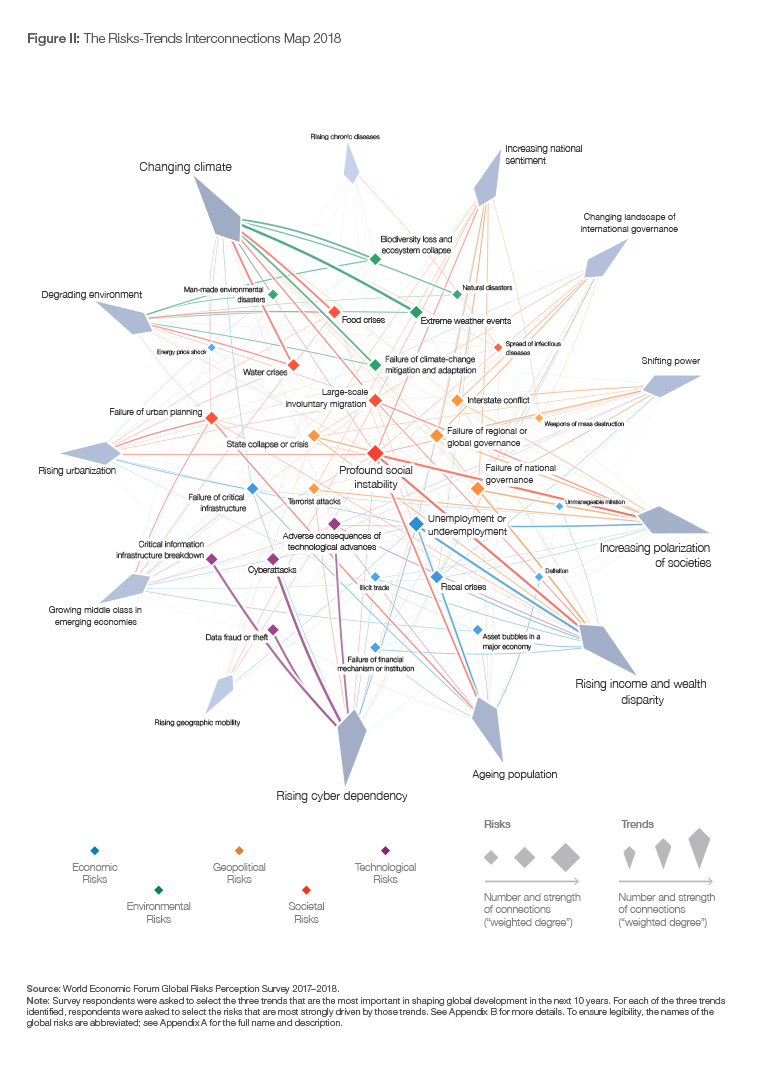
Efforts by many across the world are starting to weave this web of solutions. J-WAFS’ benefactor, MIT alumnus Mohammed Abdul Latif Jameel has supported numerous notable philanthropic activities in job creation, global development, arts and culture, and education through his social enterprise organization Community Jameel. The social aspirations of these initiatives also guide the activities of the commercial businesses of Abdul Latif Jameel, in particular through their investments addressing global challenges such as renewable energy and in support of the development of the Middle East, North Africa, and Turkey region. One Abdul Latif Jameel business, for example, is delivering solutions in the water sector. Almar Water Solutions addresses water scarcity and water quality challenges through the development of integrated infrastructure that includes water treatment, water reuse, and desalination projects for municipal as well as industrial sectors.
Along with individuals and institutions like these across the globe, J-WAFS is working to bring integrated and multidisciplinary solutions to the complex web of challenges we face.
To find out more about the Abdul Latif Jameel World Water and Food Security Lab, visit our website.

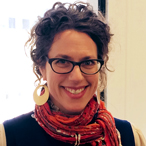 |
Andi Sutton is the Communications and Program Manager for the Abdul Latif Jameel World Water and Food Security Lab (J-WAFS) at MIT. Andi manages communications and outreach for J-WAFS, overseeing comprehensive communications strategies for the lab and coordinating our contact with various stakeholders. She also supports J-WAFS’ varied activities, including workshops and events, external proposals, and J-WAFS grants and fellowship programs. |


 Added to press kit
Added to press kit


